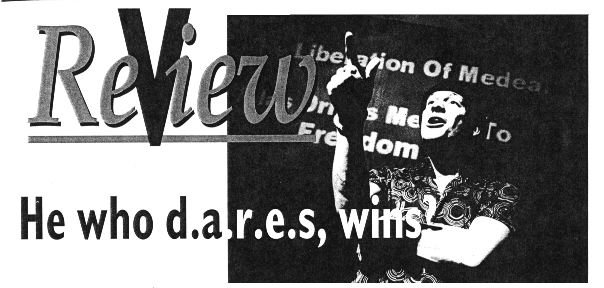© 1997 jinghiz@msn.com

. ACROSS THE WORLD, scientists of many nationalities are engaged in the process of mapping humanity's genetic inheritance, in the hope - it is said - of being able to recognise, mark and even eradicate a wide variety of inherited illnesses and conditions. Once this knowledge exists, however, the increasing fear among some disability groups is that the forgotten Holocaust of World War Two - the sterilisation, experimentation and murder, by Nazi Germany, of thousands of "abnormal" disabled people - will be completed far more thoroughly. Potentially disabled fetuses are already aborted with the permission of the parents, and the state-enforced sterilisation of people with inheritable disabilities is not science fiction.
This is the subject which lies at the heart of a powerful new piece of political drama originated at Theatre Workshop in Edinburgh. Touching on the limits of passive resistance, and the motivations of terrorism Robert Rae's d.a.r.e. asks a very simple question: what is the point of disabled people chaining themselves to buses and underground trains, demanding fully accessible public transport, when medical science could soon cleanse the human gene pool of all those needing accessible transport?
d.a.r.e. (Disabled Anarchists Revolutionary Enclave) is a group ot four disabled people, who - using the names of ancient Greek warriors "meet" in a discussion forum on the internet and come under the direction of the unseen "Jason".
Having reached the limits of patience with the passive, nonviolent tradition of disabled protest in Britain (that has not moved disability issues far up the mainstream political agenda) the four begin "to fight back." Their first mission is to rescue a disabled woman from the family and social workers who want to sterilise her. Uniting her with her disabled lover, d.a.r.e. looks forward to the arrival of offspring, who are highly likely to be disabled, but also might just be the next Beethoven or Stephen Hawking.
d.a.r.e. is not a work that gives catharsis to the emotions of most audiences; it instead shines light on a subject "no one else will touch", according to deviser and. director Robert Rae, through a startling barrage of projected images, sampled sounds, club music and on-stage action. The cast of four actors - the acclaimed performer, writer and director Nabil Shaban, the exuberant Daryl Beeton (last seen in Graeae's touring production of Joe Orton's What the Butler Saw), and locals John Hollywood and Jim McSharry - mix a variety of disabilities (both inherited and injuries) and the internal debates within "the disability movement".
Yet it is not an unemotional production; there is a strong passion and eloquence which comes from real people struggling against the eugenics holocaust facing them. It is an uncompromising piece of theatre, based on the life experiences of the disabled cast.
It is a play in two parts, which are brutally separated by the death of a d.a.r.e. activist. Before, there is energy, power and joy as the characters are introduced, brought together and successfully complete their first missions. After, there is recrimination, doubt and the inward criticisms of personal motivations and background; almost as an afterthought (as "dare" becomes a uniting word of protest throughout the disability movement) the group reforms to continue the battle. In this respect, the show's improvisational nature is rather too obvious, but it certainly is not a major failing.
Largely due to funding limitations, d.a.r.e. in its current form has only a Scotland-limited tour (Edinburgh, Glasgow, Perth, Aberdeen, Melrose, East Kilbride and - the exception that proves the rule - Sheffield). This is a shame, since the subject deserves a far larger profile than this limited run will allow (that said, media coverage has been well coordinated in Scotland). Perhaps a successful Scottish tour will lead to a wider UK run, including London; let's hope so. However, considering its use of projected, digitalised images, video recordings and sampled news coverage, the production could be very easily adapted for television. Very Powerful and controversial television.
Disability View - October 1997
© 1997 jinghiz@msn.com